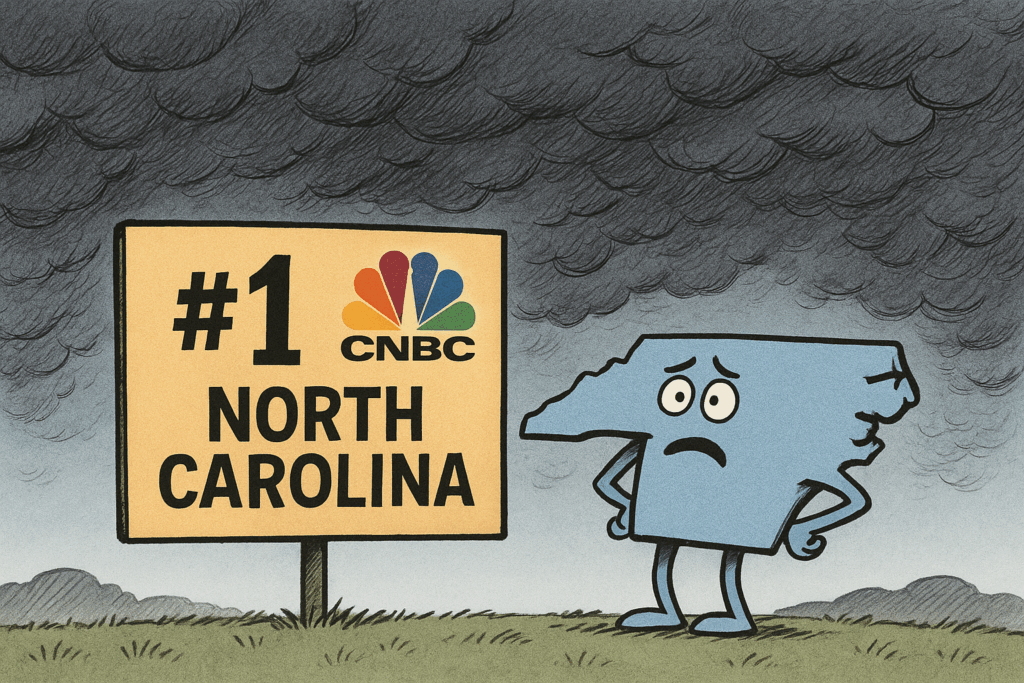Why do North Carolina politicians from both parties cater to a ranking built on political ideology instead of real results for our state’s businesses and residents?

By Sam Grote
Beacon Media
I’ve spent most of my career investing in and building businesses, and I currently run a non-profit from my home in Winston-Salem that researches issues impacting our state’s economic and business growth.
I believe that sustainable business growth is the surest path to a better future for all North Carolinians. After all, we spend 40 hours a week, 50 weeks a year, for 40-plus years working to build a good life. So naturally, the best way to improve people’s lives is to create an economy with an abundance of great jobs and the opportunity for a great life.
That’s why I was shocked last month when CNBC crowned North Carolina the No. 1 state for business. Politicians across the General Assembly, Republican and Democrat, including Gov. Josh Stein, seized on this headline as indisputable proof that their policies are working.
When I dug into CNBC’s methodology, it all made sense. The key is that this is not a transparent, objective ranking based on actual results – it’s a hidden state-by-state scoring system shaped by political ideology. The effect is that states that already align with CNBC’s worldview — low corporate taxes, weak labor protections, generous corporate handouts — magically rise to the top. This isn’t analysis — it’s PR. The goal is to promote certain policies as “good” because the people who favor them built a ranking system that says so.
Let’s dive into this:
- The Criteria Are Hidden: CNBC claims to use 135 metrics — but they don’t list these metrics where the data comes from. This means there’s no way to assess their exact methodology or even verify the math. Without transparency, the scoring system can be shaped to favor the outcomes CNBC wants.
- There are Different Rules for Different States: CNBC also weighs the importance of each category differently for each state — based on how much CNBC says the state talks about those issues. So if a state is performing poorly in a certain area, but CNBC decides that area “wasn’t a priority,” it gets a pass. That’s not just subjective — it makes the entire ranking meaningless. You aren’t comparing states when every state is graded with a different formula.
- The Results are Ideology-Driven: Finally, CNBC focuses on policies — which are inputs — rather than results. Things like corporate tax rates and corporate subsidies, or how “hospitable” a state is to AI and crypto matter to the corporate executives who watch CNBC and drive markets for big investors. They don’t matter to small businesses and people who actually live in North Carolina.
Now, look — some of those policies might be good. Others might not. The only way to know is by looking at how they actually affect performance. CNBC didn’t do that.
If folks at CNBC had measured outcomes, they would have seen that our state trails most of the US on almost every key measure of economic health and quality of life, according to state and federal databases:
- 32nd in GDP per capita
- 42nd in median household income
- 31st in high school graduation rates
- 37th in pre-K enrollment
- 24th in U6 Unemployment Rate (includes marginally attached and employed part time)
- 36th in child poverty
- 40th in homeownership
- 40th in health insurance coverage
- 37th in life expectancy
And the list goes on.
This data makes it clear that CNBC’s ranking is about politics, not the lives of North Carolinians.
That’s why the politicians and business groups in power love these kinds of rankings. Because when the actual numbers don’t look so great — when the data shows people are falling behind — it gives them something else to point to.
So what do we do with all of this?
We shift the conversation away from rankings — and toward results.
The people of North Carolina don’t live in CNBC headlines. They live in the day-to-day reality of wages that are too low, housing that’s too expensive, healthcare that’s hard to access, and schools that aren’t setting their kids up for success.
We ask tougher questions. Demand better data. And hold our leaders accountable — not based on what national media organizations say, but on how their people are actually doing.
That’s how we build a North Carolina that doesn’t just look good on paper — but delivers real results for the people who call it home.
Sam Grote is CEO of the NC Business Impact Forum, a nonprofit that uses data-driven research to advance sustainable economic growth in North Carolina. This column is syndicated by Beacon Media and is available to republish for free on all platforms under Beacon Media’s guidelines.